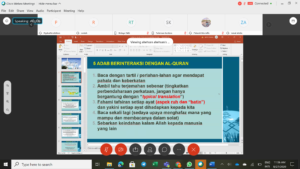- Surah Al-Mulk akan menjadi syafaat kepada orang yang membacanya
Intipati ayat 1-5:
- Ayat 1:
- Surah Al-Mulk dimulai dengan perkataan di mana Allah Membesarkan Dirinya dari sudut pemberian keberkatan dan nikmat yang tidak dapat terkira meskipun nikmat dan keberkatan diberikan kepada semua individu adalah berbeza
- Berkaitan dengan Surah Al Tahrim: Ayat 10-11. Hati manusia itu di tangan Allah. Kehebatan dan keagungan di bawah kuasa Allah SWT. Dua ayat tersebut menunjukkan 2 contoh isteri kepada 2 orang Nabi. Ia menunjukkan bahawa nikmat hidayah Allah dikurniakan kepada siapa yang diinginiNya, bukan yang diingini oleh manusia. Manusia mempunyai had kekuasaan dalam merealisasikan keinginan.
- Pandemik COVID-19 digeruni oleh semua orang. Ia menunjukkan kekuatan dan kekuasaan Allah SWT yang tidak dapat ditentang dan dihalang oleh manusia atau ciptaanNya yang lain.
- Ayat 2:
- Surah Al-Mulk banyak nilai-nilai berbentuk ancaman dan juga amaran tentang balasan terhadap dosa. A wake up call surah. Ayat kedua ini menekankan tentang aspek kematian (sebab itu kematian – al maut – didahului oleh kehidupan – al hayat).
- Kehidupan merupakan ujian yang diberikan kepada individu. Ujian yang diberikan berbeza mengikut kategori manusia. Contoh: Ujian seorang Nabi berbeza dengan individu yang bukan Nabi. Setiap daripada manusia akan diuji, dan tidak terlepas dari ujian besar mahupun kecil yang berbeza antara satu sama lain (Rujuk Surah Al Fajr: Ayat 15-16). Allah SWT memberikan ujian berdasarkan perkadaran yang diketahui oleh Allah SWT. Kekayaan merupakan ujian seperti kemiskinan. Dengan ujian kekayaan, seorang insan boleh sama ada menjadi lebih jauh dari Allah SWT atau istidraj atau menjadi lebih dekat kepada Allah SWT. Dengan ujian kemiskinan juga, seorang boleh menjadi mulia di sisi Allah dan sebaliknya.
- Ayat 3:
- Allah SWT mencipta 7 lapisan langit. Allah SWT melontarkan soalan (mencabar) untuk manusia fikirkan: Adakah ketidakseimbangan, ketidaksempurnaan, kekurangan dan kecacatan pada ciptaanNya?
- Allah SWT mencabar untuk manusia lihat kembali (berkali-kali) tentang ciptaanNya.
- Ayat 4:
- Allah SWT mencabar untuk manusia lihat kembali (berkali-kali) tentang ciptaanNya. Ayat ini mengulang kembali cabaran Allah SWT untuk manusia untuk mencari ketidakseimbangan, ketidaksempurnaan, kekurangan dan kecacatan pada ciptaanNya.
- Allah SWT menegaskan meskipun berkali-kali kita mencuba mencari ketidakseimbangan, ketidaksempurnaan, kekurangan dan kecacatan pada ciptaanNya, kita tidak akan berhasil dan malahan berasa hampa.
- Ayat 5:
- Allah SWT mencipta alam lain yang sangat banyak (dikiaskan sebagai bintang-bintang di langit – yang kita sebagai manusia mampu lihat sebagai bintang yang kita lihat sebagai perhiasan langit, panduan kepada pelayar, alat merejam syaitan – Rujuk Surah Al Saffat: Ayat 6-10).
- Alam yang dicipta Allah SWT amat banyak dan manusia tidak mampu untuk mengetahui kesemuanya. Oleh yang demikian, patutkah sebagai manusia, kita berasa sombong dan berasa kita berkuasa? Kita patut sentiasa muhasabah tentang diri kita. Tiada jaminan tentang kehidupan kita kecuali ianya bergantung kepada Allah SWT.
- Baca surah Al Sajadah dan Al-Mulk sebelum tidur (amalan Rasullullah SAW)






